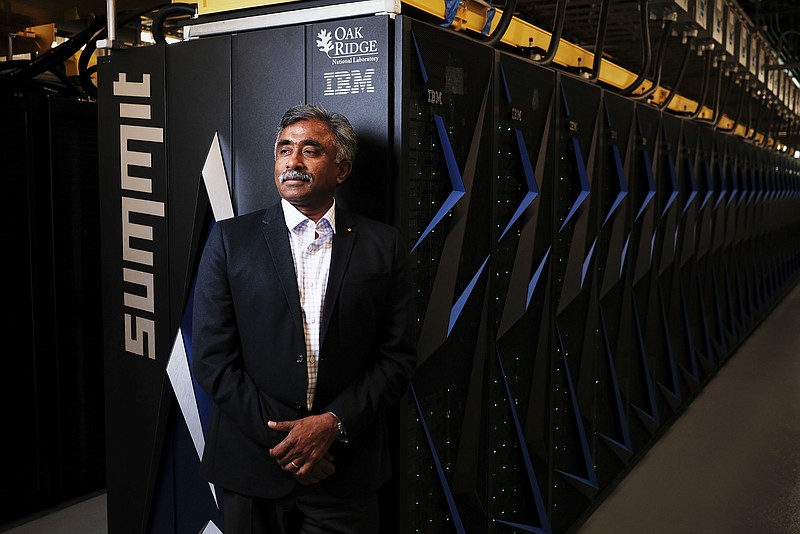Made in Tennessee
America won bragging rights in the newest race to build the world's fastest supercomputer, The New York Times wrote Friday.
Actually, to be more accurate, the Oak Ridge National Laboratory right here in the Volunteer State won those bragging rights. And they named the new fastest-ever computer - the one that beat out China's five-year champion - Summit.
Well, of course.
Summit, which cost $200 million to build, is not just fast - it is also at the forefront of a new generation of supercomputers that are adding artificial intelligence and the ability to handle vast amounts of data to traditional supercomputer technology. Their smarts and their speeds will tackle the most daunting computing challenges in science, industry and national security. Already they do things like simulate nuclear tests, predict climate trends, find oil deposits and crack encryption codes.
We mere mortals would need 6.3 billion years to do what Summit can do in a second, according to computer experts.
Jack Dongarra, a computer scientist at the University of Tennessee who tracks supercomputer speeds and rankings, offered another analogy in The Times: UT's football stadium in Knoxville seats about 100,000 people. If it was full, and everyone in it had a modern laptop, it would take 20 stadiums full of similarly equipped people to match the computing firepower of the Summit.
Summit is made up of rows of black, refrigerator-size units that weigh a total of 340 tons and are housed in a 9,250-square-foot room. The computer contains 9,216 central processing chips and 27,648 graphics processors strung with 185 miles of fiber-optic cable.
But the supercomputer also is a super power consumer, requiring enough electricity to light 8,100 American homes. Cooling it also is a tall order - 4,000 gallons of water a minute.
Whew!
Trump-Putin bromance lives on
On Thursday, Russian President Vladimir Putin seemed to gloat with something of an "I-told-you-so" moment about Europe's tariff tiff with Donald Trump.
He was talking during his annual and nationally broadcast call-in show when he said Europeans are finally getting their comeuppance for showing excessive deference to Washington - and getting a taste of the way the United States had long treated Russia with sanctions, which he likened to tariffs.
The very next day, on Friday as Trump traveled to Canada for the annual G-7 gathering with America's closest allies, Trump made a surprise call to reinstate Russia into the group.
"Russia should be in this meeting. Why are we having a meeting without Russia being in the meeting?" Trump asked reporters. "You know, whether you like it or not - and it may not be politically correct - but we have a world to run. And in the G7, which used to be the G8, they threw Russia out. They should let Russia come back in. Because we should have Russia at the negotiating table."
Funny, huh? But not as funny as that Russian call-in show. The Washington Post reported there were no questions about Russian interference in the 2016 U.S. presidential race, but Putin brought it up when one of the hosts asked him to tell a joke.
Putin mentioned seeing a German news headline declaring, "Donald Trump pushes Europe into Putin's arms."
"So, we influenced the U.S. elections, and he gifted us Europe in return?" he asked. "Utter idiocy. You can't describe this as anything other than a joke."
The Post wrote, "Seconds later, Putin was asked what piece of advice from his father would he like to pass on to his grandchildren. "'Don't lie,' the Russian president said."
Hmmm.
Trump's ACA suit bolsters Dems
The newest GOP attack on the Affordable Care Act is underway.
The Trump Justice Department is now saying that crucial provisions of the ACA - primarily protecting consumers with pre-existing medical conditions - are unconstitutional.
In a court case filed in federal court by Texas and 19 other states, the Justice Department said those provisions were part of "an unconstitutional scheme" that required most Americans to carry health insurance.
Attorney General Jeff Sessions also says the Department of Justice won't defend the ACA's protections. The legal filing argues in favor of invalidating the safeguards for Americans with pre-existing conditions.
Democrats, seeing a new wind to propel a blue wave in the mid-terms, should line up to shake Sessions' hand.
Polls have shown not only that health care is a top issue for many voters, but it's also an issue that helps Democrats. An NBC/Wall Street Journal poll, released the day before the Trump administration decision was unveiled, found that among those who said health care was their most important issue, only 21 percent prefer GOP control of Congress, compared to 67 percent who prefer Democratic control.
